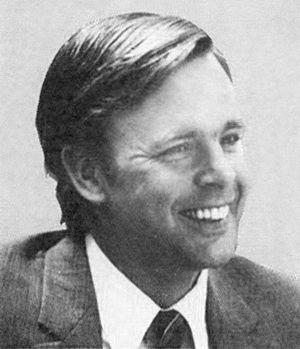Peter Plympton Smith facts for kids
Quick facts for kids
Peter Plympton Smith
|
|
|---|---|
 |
|
| Member of the U.S. House of Representatives from Vermont's at-large district |
|
| In office January 3, 1989 – January 3, 1991 |
|
| Preceded by | Jim Jeffords |
| Succeeded by | Bernie Sanders |
| 76th Lieutenant Governor of Vermont | |
| In office January 10, 1983 – January 3, 1987 |
|
| Governor | Richard Snelling Madeleine Kunin |
| Preceded by | Madeleine Kunin |
| Succeeded by | Howard Dean |
| Personal details | |
| Born |
Peter Plympton Smith
October 31, 1945 Boston, Massachusetts, U.S. |
| Political party | Republican |
| Education | Princeton University (BA) Harvard University (MA, EdD) |
Peter Plympton Smith was born on October 31, 1945. He is an American educator and politician. He has held many important jobs throughout his career.
Peter Smith served as a member of the United States House of Representatives for Vermont. He was also the Lieutenant Governor of Vermont. Beyond politics, he is known for his work in education. He helped start two colleges and worked for a big international organization called UNESCO.
Contents
Early Life and Education
Peter Smith was born in Boston, Massachusetts. He grew up in Burlington, Vermont. His father, Frederick Plympton Smith, was a banker and a state senator in Vermont.
Peter went to Phillips Academy and graduated in 1964. He then studied history at Princeton University, earning his degree in 1968. Later, he continued his education at Harvard University. He received a Master of Arts in Teaching in 1970. In 1983, he earned his Doctor of Education degree from Harvard. This degree focused on administration and planning in education.
A Career in Public Service
Peter Smith started his career helping the Vermont Commissioner of Education for a year. In 1970, he became the first president of the Community College of Vermont. This college is part of the Vermont State Colleges system.
He first ran for public office in 1978. He wanted to be the Lieutenant Governor of Vermont. He won the Republican primary election but lost the main election.
Between 1981 and 1983, he served as a state senator for Washington County, Vermont. In 1982, he was elected Lieutenant Governor. He served two terms in this role. In 1986, he ran for Governor of Vermont but was not elected.
After working as a Vice President at Norwich University, he was elected to the United States House of Representatives in 1988. He represented Vermont's single congressional district. In 1990, he ran for re-election but was defeated by Bernie Sanders.
Helping Colleges Grow
From 1991 to 1994, Peter Smith was a dean at George Washington University. He led the Graduate School of Education and Human Development.
In 1994, he became the first president of California State University, Monterey Bay. He held this position until 2005. This was a new university, and he helped it grow.
After that, from 2005 to 2007, Peter Smith worked for the United Nations Educational, Scientific, and Cultural Organization. He was the assistant director general for education. In this role, he helped guide education efforts around the world.
In April 2016, the University of Maryland University College announced that Peter Smith would join them. He was appointed as a special professor to help improve the school's learning services. He retired from that position in 2022.
What Books Did He Write?
Peter Smith has written several books about education. These books share his ideas on how people learn and how colleges can improve.
- Your Hidden Credentials: The Value of Personal Learning Outside College (1986) talks about how learning from life experiences can be valuable.
- The Quiet Crisis: How Higher Education Is Failing America (2004) discusses challenges in higher education.
- Harnessing America's Wasted Talent: New Dimensions for Higher Education (2010) explores new ways for colleges to help people.
- Free-range Learning in the Digital Age: The Emerging Revolution in College, Career, and Education (2018) looks at how digital tools are changing learning.
Later Years
In 2016, Peter Smith was one of thirty former Republican congressmen who signed a letter. This letter expressed their opposition to Donald Trump's candidacy for president.

